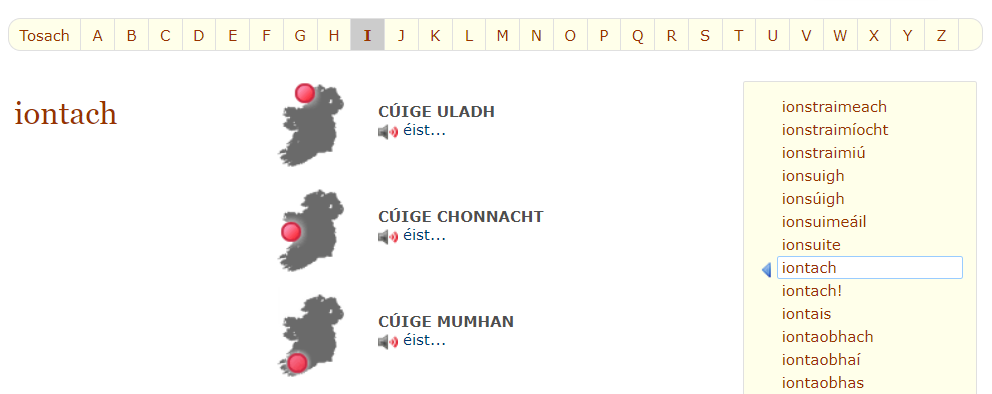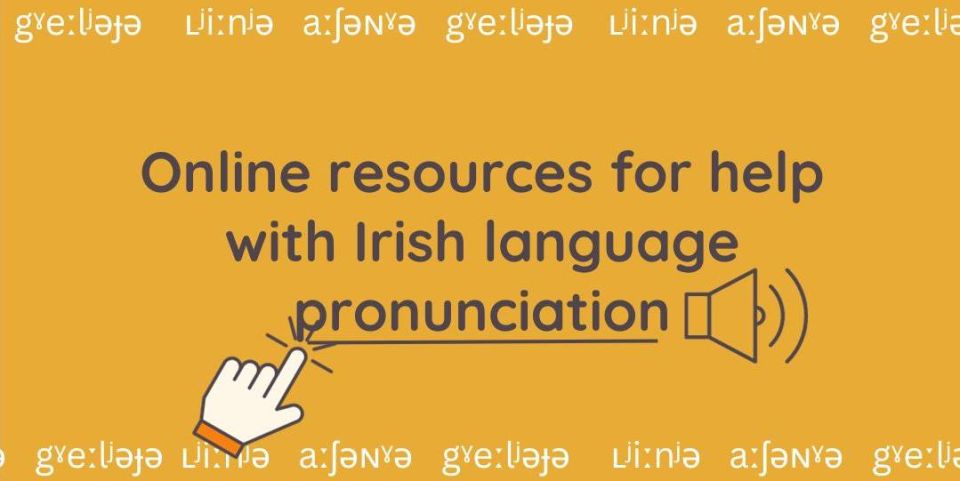
Online resources for help with Irish language pronunciation
English language phonics are often used to explain the pronunciation of Irish words – for example, ‘shook’ is used to represent the pronunciation of the Irish word ‘sioc’. This can be useful but, as the Geeky Gaeilgeoir says, it is preferable, in terms of language skills, to get used to the phonics of Irish from the beginning. Here’s a summary of the main resources that are available, free of charge, to help you.
There is no such thing as a ‘spoken standard’ in Irish – although there is a written standard. Pronunciation help is therefore usually provided in the three main dialects – Ulster, Connacht and Munster Irish.
abair.ie
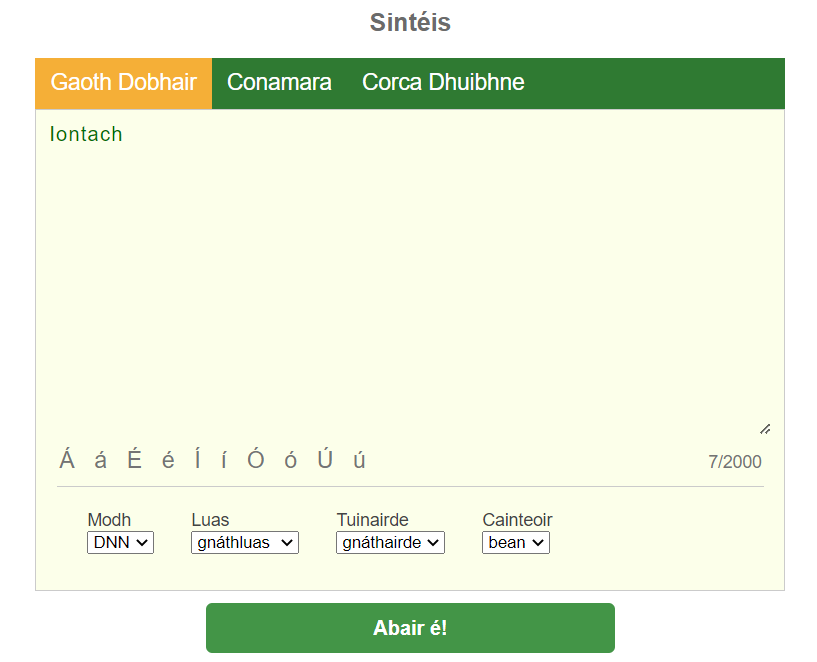
ABAIR is a project of the Phonetics and Speech Laboratory at the School of Linguistic, Speech and Communication Sciences in Trinity College, which has been developing voice synthesis for Irish since 2008. The ABAIR website is provided in both English and Irish and provides pronunciation help in the three major dialects – Ulster, Connacht and Munster. If you enter your Irish word, you can hear it pronounced in your desired dialect.
Foclóir.ie
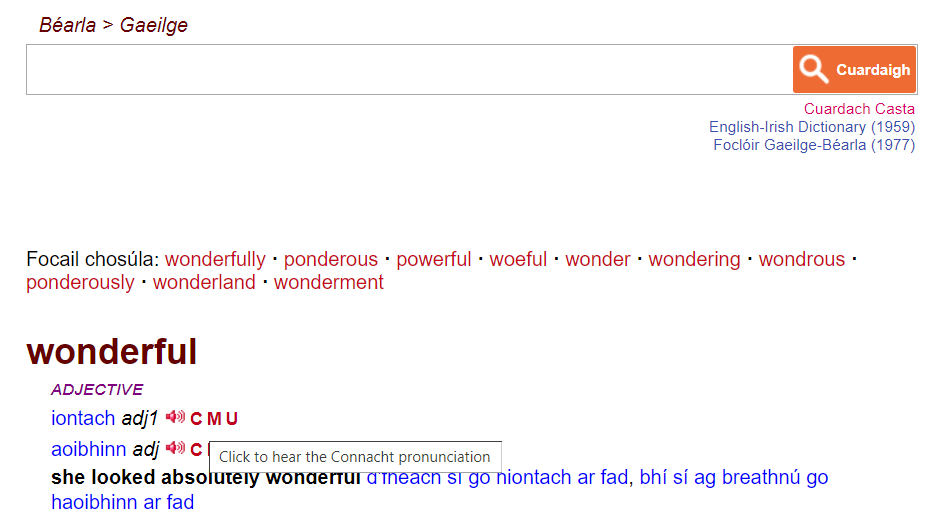 This is the website of the New English-Irish Dictionary. After you have searched for and found your Irish word, you can also listen to the pronunciation of the word, if it is available, in all the main dialects. The dictionary team has published videos in English and in Irish on how to find the sound files, but here is an example of the entry for the word ‘iontach’.
This is the website of the New English-Irish Dictionary. After you have searched for and found your Irish word, you can also listen to the pronunciation of the word, if it is available, in all the main dialects. The dictionary team has published videos in English and in Irish on how to find the sound files, but here is an example of the entry for the word ‘iontach’.
Teanglann.ie
Teanglann is the name given to the online Language and Dictionary Library. A phonetics database is available in the library, where audio files can be found for the three major dialects. These were added as part of the New English-Irish Dictionary project. See below for the sound files display for the Irish word ‘iontach’:
Breacadh.ie
Breachadh’s main priority is to provide resources through Irish for adult learners in the Gaeltacht. One resource is Mar a Déarfá!, a phonics/literacy progression program, which focuses on the sounds the native speaker makes in his own spoken language, one outcome of which is An Córlán, a collection of ‘sound-spellings’ in the main dialects. An Córlán is only available in Irish.
Versions of An Córlán are available for these areas:
Forvo.com
forvo was created so that audio files from all languages in the world could be made available in one place. The sound files are collected from contributors and it is possible to request the pronunciation of a certain word if it does not exist.
Léighleat.com
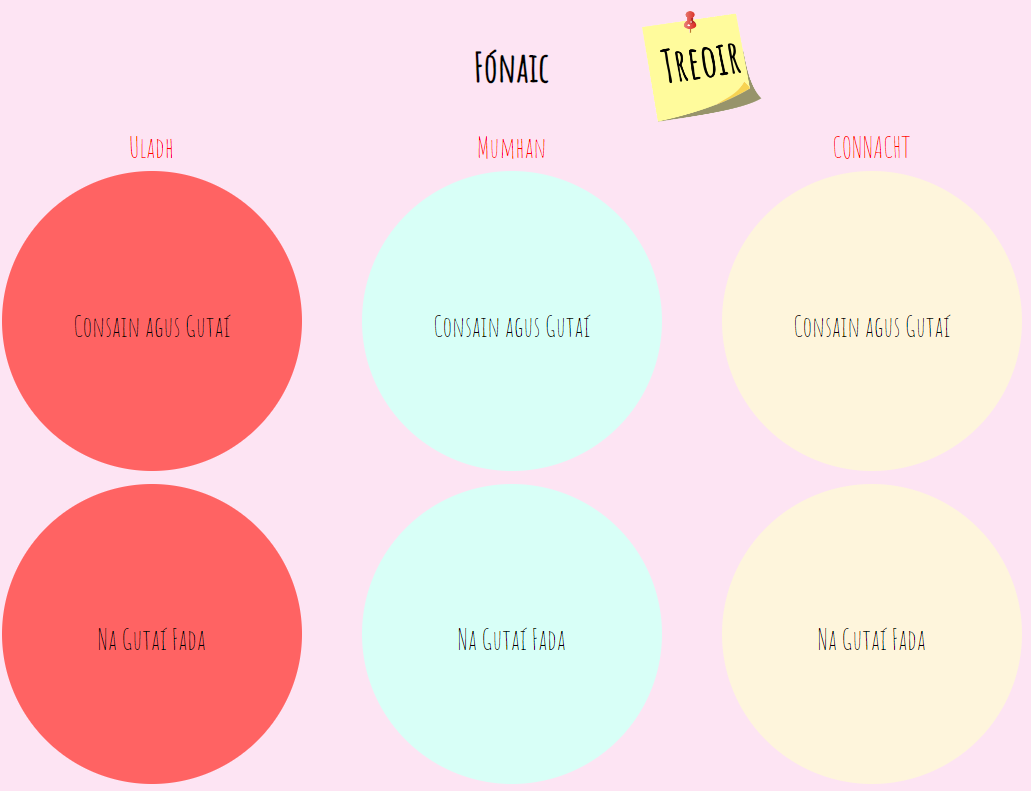 This website was established in 2014 to provide digital resources for primary school teachers to support them in teaching Irish. To support the ‘Fónaic agus Rann, Cleachtaí agus Greann’ phonics scheme for babies, they created a free interactive resource to complement the phonics lesson. The resource has been compiled for the three major dialects – Munster, Connaught and Ulster. The songs are heard being sung along with the sound associated with each word. Although the resource is aimed at children, it would also be useful for the adult learner.
This website was established in 2014 to provide digital resources for primary school teachers to support them in teaching Irish. To support the ‘Fónaic agus Rann, Cleachtaí agus Greann’ phonics scheme for babies, they created a free interactive resource to complement the phonics lesson. The resource has been compiled for the three major dialects – Munster, Connaught and Ulster. The songs are heard being sung along with the sound associated with each word. Although the resource is aimed at children, it would also be useful for the adult learner.
Cabhair Eile
General instructions are also available on the pronunciation of Irish from various writers and authors on the internet, from Donnacha Cionga, nualéargais.ie, bitesize.irish, to the geeky gaeilgeoir.
The pronunciation of Irish is of course integral to any Irish-language tutorial videos online. but this one in particular, Sounds and Spelling of Irish / Fuaimniú & Litriú na Gaeilge, focuses especially and comprehensively on pronunciation.
As suggested by many Irish language experts, there is nothing better than listening to Irish as it is spoken to get used to the pronunciation, especially the high-quality programs on Raidió na Gaeltachta and TG4. A series of transcripts and audio from Dúchas.ie is available at Tuairisc.ie – Litríocht Bheile. They also have another set of videos, Fís agus Fuaim, which are in the Irish language and have Irish-language subtitles – for example Cuairt ar Inis Mór. Audio files are often available on logainm.ie too, to help with the pronunciation of place names – for example Leitir Ceanainn

